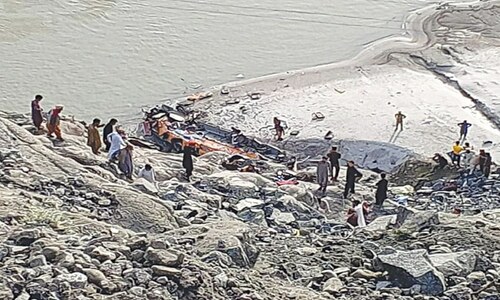ISLAMABAD: The Supreme Court on Tuesday disposed of a set of identical petitions seeking the disqualification of Prime Minister Nawaz Sharif as the ill-prepared counsel failed to convince the court that the premier had misstated facts on the floor of the house.
“The petitions are dismissed,” was the one-line verdict by Chief Justice Nasirul Mulk, who headed a seven-judge larger bench hearing all three petitions.
The petitions were moved by Insaf Lawyers’ Forum Senior Vice President Gohar Nawaz Sindhu, Pakistan Tehreek-i-Insaf (PTI) leader Ishaq Khakwani and Pakistan Muslim League (PML-Q) president Chaudhry Shujaat Hussain.
All three asked the court to unseat the prime minister for his alleged misstatement on the floor of the National Assembly on Aug 29, when he said that the government had not asked the armed forces to mediate and become a guarantor between the government and the protesting PTI and Pakistan Awami Tehreek (PAT).
“The decision has given much-needed moral support to the Pakistan Muslim League-Nawaz (PML-N) government that is currently beset on all sides with controversy,” said Sheikh Ehsanuddin, a former president of the Lahore High Court Bar soon after the short order was read out.
Gohar Nawaz Sindhu was the first to argue his case before the larger bench and was asked to read out the Aug 29 statement that the prime minister made in parliament.
When the counsel read out the text of the statement, which he had downloaded from the official website of the National Assembly, it emerged that in his speech, the prime minister had referred to a statement by Interior Minister Chaudhry Nisar, who had told the lower house (in Urdu) that neither the armed forces had asked for the role of facilitator, nor had the government asked them to.
“Do you attribute the statement of Chaudhry Nisar to the respondent,” asked Justice Asif Saeed Khosa.
At this, the counsel referred to a clarification issued by the Inter-Services Public Relations (ISPR) via the social networking site Twitter, stating that the army was asked to act as a guarantor by the government.
At a later stage during the hearing Justice Khosa wondered whether a message on Twitter or Facebook could be construed as an official mode of communication.
“I would not be able to know if, tomorrow, some government notifications are issued via Twitter or Facebook, since I don’t use these social networking tools,” observed Justice Khosa.
Even Attorney General Salman Aslam Butt appeared to be in the dark when the chief justice inquired about the ISPR’s official statement on the issue.
But a copy of a press release provided by one of the petitioners suggested that the army chief was asked to play the role of facilitator by the government.
How could the PM be involved when the ISPR statement itself says that the government, and not the prime minister, had made the request, the chief justice observed.
Justice Khosa reminded the petitioner that defaming the armed forces was an offence under the Pakistan Penal Code (PPC) and asked how the high court could exercise jurisdiction over a request to convict an individual, which was the job of a trial court.
Later, Irfan Qadir, who is counsel for the PTI’s Ishaq Khakwani, when asked what fundamental rights were impinged, said that Article 25 of the Constitution that ensures equality of all citizens before law. It was this right that had been infringed, he said.
To substantiate, he argued that the media should be taken seriously, recalling that the court had in the past taken several actions suo motu on media reports. He also recalled that a number of parliamentarians had been disqualified on the petition of a citizen, Mahmood Akhtar Naqvi.
At this point, Justice Jawwad S. Khawaja referred to Article 243, which stipulates that the federal government will have command and control of the armed forces.
At this, Irfan Qadir argued that the importance of the army chief cannot be played down because he enjoys a much higher position than the defence secretary, who only acts as “the post office”.
However, Justice Saqib Nisar observed that both the army chief and the defence secretary have different and separate roles to play.
After the judgment was handed down, Irfan Qadir told reporters that it was not the PM but the court that was on trial, since the people would ask why three amicus curiae, who were earlier appointed by the court, had not been heard before the petitions were dismissed.
Published in Dawn December 10th , 2014















































Dear visitor, the comments section is undergoing an overhaul and will return soon.